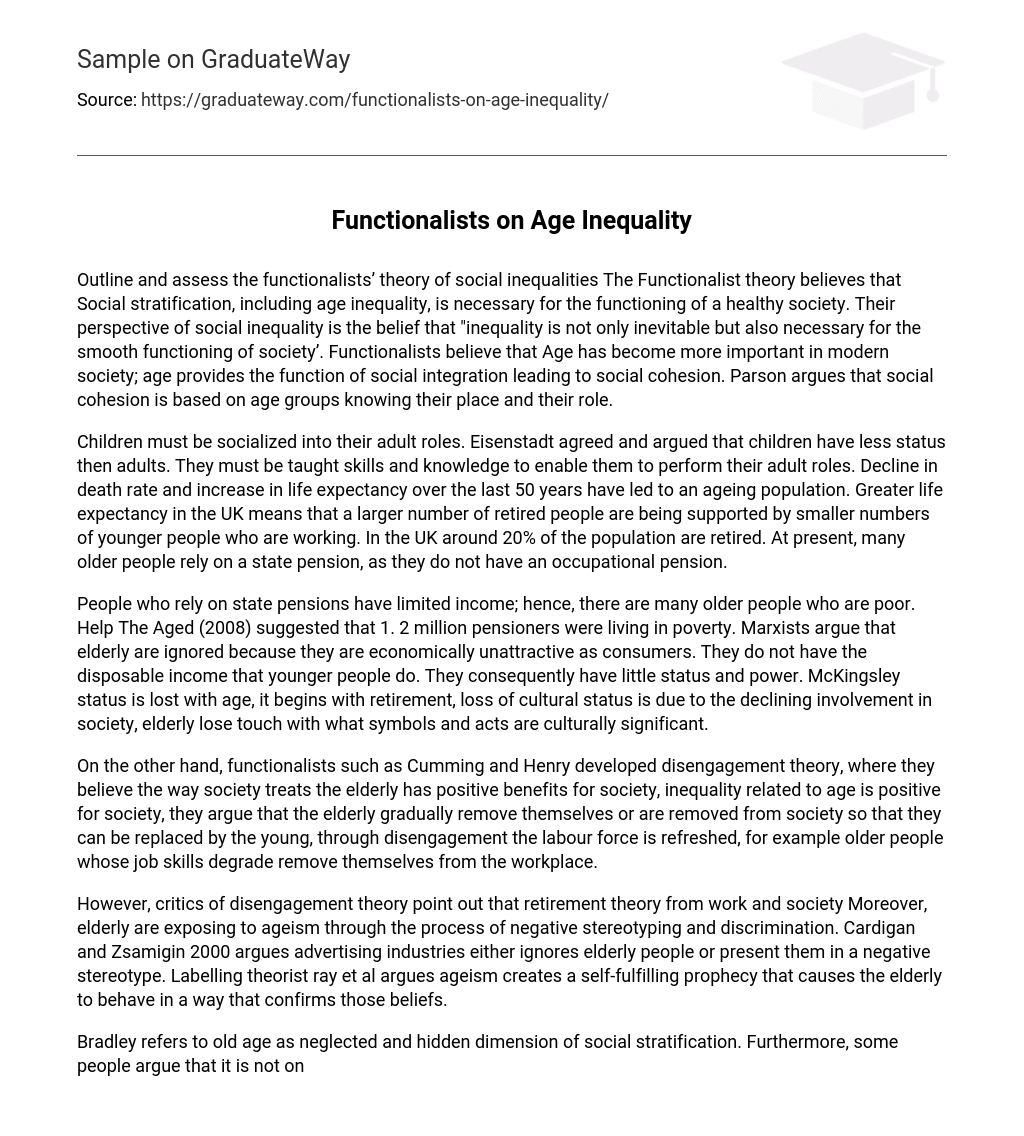Outline and assess the functionalists’ theory of social inequalities The Functionalist theory believes that Social stratification, including age inequality, is necessary for the functioning of a healthy society. Their perspective of social inequality is the belief that “inequality is not only inevitable but also necessary for the smooth functioning of society’. Functionalists believe that Age has become more important in modern society; age provides the function of social integration leading to social cohesion. Parson argues that social cohesion is based on age groups knowing their place and their role.
Children must be socialized into their adult roles. Eisenstadt agreed and argued that children have less status then adults. They must be taught skills and knowledge to enable them to perform their adult roles. Decline in death rate and increase in life expectancy over the last 50 years have led to an ageing population. Greater life expectancy in the UK means that a larger number of retired people are being supported by smaller numbers of younger people who are working. In the UK around 20% of the population are retired. At present, many older people rely on a state pension, as they do not have an occupational pension.
People who rely on state pensions have limited income; hence, there are many older people who are poor. Help The Aged (2008) suggested that 1. 2 million pensioners were living in poverty. Marxists argue that elderly are ignored because they are economically unattractive as consumers. They do not have the disposable income that younger people do. They consequently have little status and power. McKingsley status is lost with age, it begins with retirement, loss of cultural status is due to the declining involvement in society, elderly lose touch with what symbols and acts are culturally significant.
On the other hand, functionalists such as Cumming and Henry developed disengagement theory, where they believe the way society treats the elderly has positive benefits for society, inequality related to age is positive for society, they argue that the elderly gradually remove themselves or are removed from society so that they can be replaced by the young, through disengagement the labour force is refreshed, for example older people whose job skills degrade remove themselves from the workplace.
However, critics of disengagement theory point out that retirement theory from work and society Moreover, elderly are exposing to ageism through the process of negative stereotyping and discrimination. Cardigan and Zsamigin 2000 argues advertising industries either ignores elderly people or present them in a negative stereotype. Labelling theorist ray et al argues ageism creates a self-fulfilling prophecy that causes the elderly to behave in a way that confirms those beliefs.
Bradley refers to old age as neglected and hidden dimension of social stratification. Furthermore, some people argue that it is not only the elderly who experience discrimination because of age. Young people also experience age discrimination in many ways. For instance young people often find it difficult to get started in employment market. Even though many young people who are working are paid minimum wage, there are 2. million children living at poverty in Britain, and young people are leaving universities with large student loans and graduate unemployment is high. According to Marxists the young provide cheap labour that can be fired or hired as necessary. Marxists would use the reserve army of labour for age groups at both ends of the spectrum. Young people (and to an extent the elderly) are often employed only during times of extremely low unemployment, when the capitalist class requires more people to sell their labour in order to obtain higher profits.
PARSONS (1954) On the other hand functionalist’s parsons argue that teenage culture is transitional, and bridges the gap between childhood and adulthood-it therefore is insecure, because it is preparing people for their later life. This explains youth unemployment and disadvantage. However, Hockey and James (1993) argues that functionalism is over deterministic, emphasizing conformity and consensus: it fails to address inequality which are result of class, gender and ethnicity and seemed to imply that the young rebel because society needs them to.
To conclude main writer of functionalism Durkheim explained age inequality through the concept of disengagement. Young people acquire status as they approach the ‘mainstream’ middle age identity, whilst the elderly lose status as they become more and more separated from the norm. Functionalists see age inequality as useful to society. Important as it integrates people in to society.





